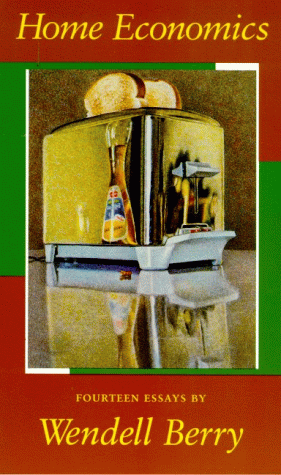 |
Home |
Catalogs |
Contact Us |

Books on:
Animal RightsBlack History
Clean Energy
Democracy
Eco Design
Eco History
Food and Nutrition
Genetic Engineering
Green Cities
Green Politics
Local Economics
Natural Building
Peace and Nonviolence
Simple Living
Trees and Forests
 |
Home Economics
by Wendell Berry
North Point Press, 1987
Purchase
on Amazon.com
The essays in Home Economics present a clearly reasoned, strongly worded indictment of our present economic system and the foolish squandering of resources that it fosters.
Praise for Home Economics
"Whether as critic or as champion, Wendell Berry offers careful insights into our personal and national situation in a prose that is ringing and clear."--from the cover of Home Economics
Quotes from Home Economics
"The 'free market' is economic Darwinism, with one critical qualification. Whereas the Darwinian biologists have always acknowledged the violence of the competitive principle, the political Darwinians have been unable to resist the temptation to suggest that on the 'free market' both predator and prey are beneficiaries. When economic ruin occurs, according to this view, it occurs only as a result of economic justice. Thus, David Stockman could suggest that the present dispossession of thousands of farm families is merely the result of the working of a 'dynamic economy,' which compensates their losses by 'massive explosions of new jobs and investment . . . occurring elsewhere, in Silicon Valley.' That these failures and successes are not happening to the same people or even to the same groups of people is an insight beyond the reach of Mr. Stockman's equipment. By his reasoning, we may readily see that the poverty of the poor is justified by the richness of the rich."
. . .
"[Fallacy] That productivity is a sufficient standard of production.
"American agriculture is fantastically productive, and by now we all ought to know it. That American agriculture is also fantastically expensive is less known, but it is equally undeniable, even though the costs have not yet entered into the official accounting. The costs are in loss of soil, in loss of farms and farmers, in soil and water pollution, in food pollution, in the decay of country towns and communities, and in the increasing vulnerability of the food supply system. The statistics of productivity alone cannot show these costs. We are nevertheless approaching a 'bottom line' that is not on our books."
"[D]ay by day, we are acting out the plot of a murderous paradox: an 'economy' that leads to extravagance. Our great fault as a people is that we do not take care of things. Our economy is such that we say we 'cannot afford' to take care of things: Labor is expensive, time is expensive, money is expensive, but materials--the stuff of creation-- are so cheap that we cannot afford to take care of them. The wrecking ball is characteristic of our way with materials. We 'cannot afford' to log a forest selectively, to mine without destroying topography, or to farm without catastrophic soil erosion. A production-oriented economy can indeed live in this way, but only so long as production lasts.
"Suppose that, foreseeing the inevitable failure of this sort of production, we see that we must assign a value to continuity. If that happens, then our standard of production will have to change; indeed, it will already have changed, for the standard of productivity alone cannot permit us to see that continuity has a value. The value of continuity is visible only to thrift."
. . .
"If economy means 'management of a household,' then we have a system of national accounting that bears no resemblance to the national economy whatsoever, for it is not the record of our life at home but the fever chart of our consumption. national economy--the health of which might be indicated by our net national product, derived by subtracting our real losses from our real gains--is perhaps a top secret, the existence of which even the government has not yet suspected.
"One reason for this is the geographical separation that frequently exists between losses and gains. Agricultural losses occur on the farm and in farming communities, whereas the great gains of agriculture all occur in cities, just as the profits from coal are realized mainly in cities far from where the coal is mined. Almost always the profit is realized by people who are under no pressure or obligation to realize the losses-- people, that is, who are so positioned by wealth and power that they need assign no value at all to what is lost. The cost of soil erosion is not deducted from the profit on a packaged beefsteak, just as the loss of forest, topsoil, and human homes on a Kentucky mountainside does not reduce the profit on a ton of coal."
"If in the human economy, a squash in the field is worth more than a bushel of soil, that does not mean that food is more valuable than soil; it means simply that we do not know how to value the soil. In its complexity and its potential longevity, the soil exceeds our comprehension; we do not know how to place a just market value on it, and we will never learn how. Its value is inestimable; we must value it, beyond whatever price we put on it, by respecting it."
"But when nothing is valued for what it is, everything is destined to be wasted. Once the values of things refer only to their future usefulness, then an infinite withdrawal of value from the living present has begun. Nothing (and nobody) can then exist that is not theoretically replaceable by something (or somebody) more valuable. The country that we (or some of us) had thought to make our home becomes instead 'a nation rich in natural resources'; the good bounty of the land begins its mechanical metamorphosis into junk, garbage, silt, poison, and other forms of 'waste.'
"The inevitable result of such an economy is that no farm or any other usable property can safely be regarded by anyone as a home, no home is ultimately worthy of our loyalty, nothing is ultimately worth doing, and no place or task or person is worth a lifetime's devotion. 'Waste,' in such an economy, must eventually include several categories of humans--the unborn, the old, 'disinvested' farmers, the unemployed, the 'unemployable.' Indeed, once our homeland, our source, is regarded as a resource, we are all sliding downward toward the ashheap or the dump."
. . .
"The awareness that we are slowly growing into now is that the earthly wildness that we are so complexly dependent upon is at our mercy. It has become, in a sense, our artifact because it can only survive by a human understanding and forbearance that we now must make. The only thing we have to preserve nature with is culture; the only thing we have to preserve wildness with it domesticity.
"To me, this means simply that we are not safe in assuming that we can preserve wildness by making wilderness preserves. Those of us who see that wildness and wilderness need to be preserved are going to have to understand the dependence of these things upon our domestic economy and our domestic behavior. If we do not have an economy capable of valuing in particular terms the durable good of localities and communities, then we are not going to be able to preserve anything. We are going to have to see that, if we want our forests to last, then we must make wood products that last, for our forests are more threatened by shoddy workmanship than by clear-cutting or by fire. Good workmanship--that is, careful, considerate, and loving work--requires us to think considerately of the whole process, natural and cultural, involved in the making of wooden artifacts, because the good worker does not share the industrial contempt for 'raw material.' The good worker loves the board before it becomes a table, loves the tree before it yields the board, loves the forest before it gives up the tree. The good worker understands that a badly made artifact is both an insult to its user and a danger to its source. We could say, then, that good forestry begins with the respectful husbanding of the forest that we call stewardship and ends with well-made tables and chairs and houses, just as good agriculture begins with stewardship of the fields and ends with good meals."
Table of Contents of Home Economics
- Letter to Wes Jackson
- Getting Along with Nature
- Irish Journal
- Higher Education and Home Defense
- Two Economies
- The Loss of the University
- Property, Patriotism and National Defense
- Men and Women in Search of Common Ground
- Six Agricultural Fallacies
- A Nation Rich in Natural Resources
- Preserving Wildness
- A Good Farmer of the Old School
- A Defense of the Family Farm
- Does Community Have Value?
Reader Comments |
